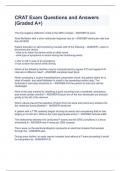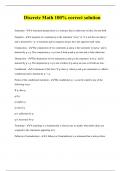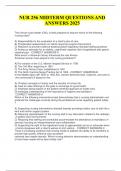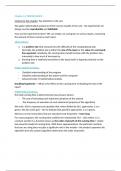Week 1 Autonomy of EU Law
Theme of the week is the nature of the EU and of EU law, in particular its autonomy as the
most foundational of all principles of EU law from which supremacy and direct effect derive.
As it is also a concept not devoid of controversy we shall also look into the different forms of
contestation of EU Law's autonomy. The autonomy of EU Law also plays an important role in
the EU's external relations, hence a discussion of the concept of autonomy of EU law is not
complete without also looking at its external dimension (EU Law vis-à-vis Public
International Law).
Literature
Dawson & Witte- The EU as a Legal Order
Introduction
- Law is important in the process of European integration.
- Role that laws play in the EU is two-fold: EU dictates the substance of integration
and EU law enforces the objectives of European integration.
- The EU has through legal principles direct effect and primacy.
- Individual citizens can litigate to protect their rights under EU law in their local
courts, while these courts are obliged to enforce such rights even against the explicit
preferences of their own MS.
- This ensures that MS cannot go back to their commitments undertaken under
EU law.
- Allows citizens to enjoy their rights> makes EU law work.
- Tension: the CJEU sees the EU legal order as hierarchically superior and autonomos,
but it irritates national legal systems which are articulating limits to European
integration.
- Ultimately: while the EU understands the enforcement of EU law as an end in
and of itself; domestic legal orders understand law as an instrument for the
attainment of deeper, more ethical commitments, and are suspicious when
EU law seems to challenge these commitments.
- → Fragility at the core of the integration project!
5.1 Integration through law
- Law is more than an instrument→ it is the purpose of eu integration.
- Double role comes with implications.
a. Required infrastructure composed of a number of legal doctrines and
institutional actors. (F.E: primacy and direct effect)
i. Governance process of European integration heavily relies on the use
of the role that law plays in the process of European integration.
1. Upside: objectives of integration not hostage to the political
winds.
2. Downside: The side-lining of political institutions also implies
the sidelinging of the process of accountability, representation
and participation.
, b. The EU’s heavy emphasis on legal enforcement is that the authority of EU law
is based on a very functional logic→ law should be obeyed.
- The two implications (a&b) make the process of integration through law vulnerable
to challenges from national judicial actors.
- Different elements of the infrastructure of the EU legal order
a. Principle of direct effect: allows citizens to invoke provisions of EU law in
their local courts directly (supported by primacy)
b. Principle of primacy: in case of conflict, EU trumps national law.
c. EU is an autonomous legal order.
d. Preliminary reference procedure
e. National courts must be in a position to grant relief to litigants where their
rights stemming from EU law are frustrated, an ability that cannot be limited
by the MS.
f. State liability.
- Double role of law thus:
1. Vehicle for integration
2. End goal of integration
→ Fragile enforcement mechanism
→ Self referential.
5.1.1 Direct effect
- Van Gend & Loos: can individuals and companies invoke norms of EU law directly
against their own MS? Can the NL be prohibited from making changes because of
their commitment, in (now) Article 30 TFEU, not to introduce any new custom
duties in the flow of products within the EU?----> Can MS be bound by EU law
against their wishes? —> YES
- Distinguish the Treaty from international Law.
- Eu Treaty is between MS and therefore between the people of those MS.
- MS decided to limit and transfer powers.
- Therefore the EU is a new legal order of international law.
- → in EU law, citizen rights play a central role and should be accorded special
protection. This special protection takes place through the doctrine of direct
effect.
- Direct effect: rights that are laid down in EU Treaty can be directly
invoked by litigants where they are violated by a MS.
- All provisions of EU law that are clear, sufficiently precise and offer an
unconditional right, are directly effective.
- Therefore Van Gend & Loo two important implications for EU law:
a. Enforcement: direct effect, solve the implementation problem.
b. The CJEU locates the source for the demand of direct effect within the EU
Treaty and the nature of the integration process itself.
→ direct effect and supremacy operate autonomously form political
preferences.
→ The CJEU is alone competent
- Criticism on the absence of political control over the application of EU law norms
- - Directives seem by nature conditional and cannot therefore be directly effective.
- CJEU tried to strengthen them
, - By creating vertical direct effect.
- Principle of estoppel
- CJEU refused horizontal direct effect.
- → Gap in the enforcement machinery.
5.1.2 Primacy
- Primacy: where national law and EU conflict, the latter trumps the former. National
law that is inconsistent with EU law must in principle be disapplied.
- Costa v ENEL: Treaty has created its own legal system. EU Law overrides national law.
- Demand of primacy is implicit of direct effect.
- Justifications:
- Distinguish EU law from international law
- Powers have been transferred and within these transferred powers
MS voluntarily agree that they can be bound by decisions of the EU.
- Crucial for the effectiveness (effect utile)
- Guarantee equality of the MS.
- Functional nature, domestic resistance emerges.
- Central promise of EU: to replace the use of armed forces with the force of law.
5.1.1 Autonomy
- Principle of autonomy: suggests that the way EU law interacts with other legal orders
is determined solely by the EU itself.
- Interpretation CJEU: no other judicial body can outrank the CJEU on questions
pertaining to the interpretation or validity of EU law, that norms of international law
cannot have an automatic binding effect on institutions when they act within the EU
legal order, and the disputes concerning questions
5.1.4 Preliminary reference procedure
- Interaction between national courts and the CJEU takes place through the
preliminary reference procedure in Article 267 TFEU.
5.2 The Fragility of integration through law
- Both the strength and weakness of integration through law lies in its exclusive
reliance on legal authority.
- Strength: highly sufficient way of securing the objectives of the process of
integration while offering a very strong enforcement mechanism against
recalcitrant MS.
- Weakness: integration through law depends on national courts remaining
sufficiently able and willing to play their role in disciplining their own MS to
secure the objectives of EU integration.
- Under threat: backsliding RoL and judicial indepence and because of a
growing assertion by national constitutional courts.
5.2.3 National (Constitutional) Identity Review
- Justification on why EU law could follow from itself (PSPP)
- The CJEU should not be purely functional or politically sensitive. The EU legal system
, should be ethical abd should protect the exact values, such as accountability or
democracy, upon which the resistance by national constitutional orders is typically
missed.
Lecture- Autonomy of EU Law
- Internal dimension/external dimension
- Perspective CJEU→ relevant because:
- Understanding specific characteristics of EU law
- Understanding functions of foundational principle of autonomy
- Contestion/challenges becasue there are multiple views in this autonomy
- Practice
A. Internal dimension/external dimension
- Relationship between EU Legal order and national legal orders MS
- Internal relationship
- Perspective CJEU: specific characteristics of EU Law
- Contestation/challenges: academic discourse
Specific characteristics of EU Law: substance
Costa/Enel & Van Gend en Loos
- Court in both cases that the Treaties created a new independent legal order because the MS
had limited their sovereign rights, this created not only obligations between MS but also
obligations and rights for individuals; more than an agreement creating obligations MSs.
- The Court highlighted the Articles:
- Van Gend & Loos: Preliminary procedure (267 TFEU); directly applicable EU Law (288
TFEU). Possibility to ask questions by national courts. Not just obligations between
MS but also between individuals and member states.
- Consequences for relationship with national legal order follow from EU law
itself.
- G&L: The treaties in specific cases have a direct effect, so an individual can
invoke EU law. EU Law has a direct effect over national law.
- Costa/Enel: the treaty article has a specific provision that EU law is directly
applicable.
- Internal dimension and primacy of EU Law.
- So both of the cases talk about the applicability from EU Law.
- The court found the consequences in EU law itself.
- Why is this revolutionary? The Court found that the consequences of EU law derive from EU
law itself.
- EU law is not just international. Normally international law will follow from national
constitution. The effect of EU law in the national legal order will follow from national
constitutional law, but now the court has ruled around this and has decided that EU law
follows from EU law itself.
-
Theme of the week is the nature of the EU and of EU law, in particular its autonomy as the
most foundational of all principles of EU law from which supremacy and direct effect derive.
As it is also a concept not devoid of controversy we shall also look into the different forms of
contestation of EU Law's autonomy. The autonomy of EU Law also plays an important role in
the EU's external relations, hence a discussion of the concept of autonomy of EU law is not
complete without also looking at its external dimension (EU Law vis-à-vis Public
International Law).
Literature
Dawson & Witte- The EU as a Legal Order
Introduction
- Law is important in the process of European integration.
- Role that laws play in the EU is two-fold: EU dictates the substance of integration
and EU law enforces the objectives of European integration.
- The EU has through legal principles direct effect and primacy.
- Individual citizens can litigate to protect their rights under EU law in their local
courts, while these courts are obliged to enforce such rights even against the explicit
preferences of their own MS.
- This ensures that MS cannot go back to their commitments undertaken under
EU law.
- Allows citizens to enjoy their rights> makes EU law work.
- Tension: the CJEU sees the EU legal order as hierarchically superior and autonomos,
but it irritates national legal systems which are articulating limits to European
integration.
- Ultimately: while the EU understands the enforcement of EU law as an end in
and of itself; domestic legal orders understand law as an instrument for the
attainment of deeper, more ethical commitments, and are suspicious when
EU law seems to challenge these commitments.
- → Fragility at the core of the integration project!
5.1 Integration through law
- Law is more than an instrument→ it is the purpose of eu integration.
- Double role comes with implications.
a. Required infrastructure composed of a number of legal doctrines and
institutional actors. (F.E: primacy and direct effect)
i. Governance process of European integration heavily relies on the use
of the role that law plays in the process of European integration.
1. Upside: objectives of integration not hostage to the political
winds.
2. Downside: The side-lining of political institutions also implies
the sidelinging of the process of accountability, representation
and participation.
, b. The EU’s heavy emphasis on legal enforcement is that the authority of EU law
is based on a very functional logic→ law should be obeyed.
- The two implications (a&b) make the process of integration through law vulnerable
to challenges from national judicial actors.
- Different elements of the infrastructure of the EU legal order
a. Principle of direct effect: allows citizens to invoke provisions of EU law in
their local courts directly (supported by primacy)
b. Principle of primacy: in case of conflict, EU trumps national law.
c. EU is an autonomous legal order.
d. Preliminary reference procedure
e. National courts must be in a position to grant relief to litigants where their
rights stemming from EU law are frustrated, an ability that cannot be limited
by the MS.
f. State liability.
- Double role of law thus:
1. Vehicle for integration
2. End goal of integration
→ Fragile enforcement mechanism
→ Self referential.
5.1.1 Direct effect
- Van Gend & Loos: can individuals and companies invoke norms of EU law directly
against their own MS? Can the NL be prohibited from making changes because of
their commitment, in (now) Article 30 TFEU, not to introduce any new custom
duties in the flow of products within the EU?----> Can MS be bound by EU law
against their wishes? —> YES
- Distinguish the Treaty from international Law.
- Eu Treaty is between MS and therefore between the people of those MS.
- MS decided to limit and transfer powers.
- Therefore the EU is a new legal order of international law.
- → in EU law, citizen rights play a central role and should be accorded special
protection. This special protection takes place through the doctrine of direct
effect.
- Direct effect: rights that are laid down in EU Treaty can be directly
invoked by litigants where they are violated by a MS.
- All provisions of EU law that are clear, sufficiently precise and offer an
unconditional right, are directly effective.
- Therefore Van Gend & Loo two important implications for EU law:
a. Enforcement: direct effect, solve the implementation problem.
b. The CJEU locates the source for the demand of direct effect within the EU
Treaty and the nature of the integration process itself.
→ direct effect and supremacy operate autonomously form political
preferences.
→ The CJEU is alone competent
- Criticism on the absence of political control over the application of EU law norms
- - Directives seem by nature conditional and cannot therefore be directly effective.
- CJEU tried to strengthen them
, - By creating vertical direct effect.
- Principle of estoppel
- CJEU refused horizontal direct effect.
- → Gap in the enforcement machinery.
5.1.2 Primacy
- Primacy: where national law and EU conflict, the latter trumps the former. National
law that is inconsistent with EU law must in principle be disapplied.
- Costa v ENEL: Treaty has created its own legal system. EU Law overrides national law.
- Demand of primacy is implicit of direct effect.
- Justifications:
- Distinguish EU law from international law
- Powers have been transferred and within these transferred powers
MS voluntarily agree that they can be bound by decisions of the EU.
- Crucial for the effectiveness (effect utile)
- Guarantee equality of the MS.
- Functional nature, domestic resistance emerges.
- Central promise of EU: to replace the use of armed forces with the force of law.
5.1.1 Autonomy
- Principle of autonomy: suggests that the way EU law interacts with other legal orders
is determined solely by the EU itself.
- Interpretation CJEU: no other judicial body can outrank the CJEU on questions
pertaining to the interpretation or validity of EU law, that norms of international law
cannot have an automatic binding effect on institutions when they act within the EU
legal order, and the disputes concerning questions
5.1.4 Preliminary reference procedure
- Interaction between national courts and the CJEU takes place through the
preliminary reference procedure in Article 267 TFEU.
5.2 The Fragility of integration through law
- Both the strength and weakness of integration through law lies in its exclusive
reliance on legal authority.
- Strength: highly sufficient way of securing the objectives of the process of
integration while offering a very strong enforcement mechanism against
recalcitrant MS.
- Weakness: integration through law depends on national courts remaining
sufficiently able and willing to play their role in disciplining their own MS to
secure the objectives of EU integration.
- Under threat: backsliding RoL and judicial indepence and because of a
growing assertion by national constitutional courts.
5.2.3 National (Constitutional) Identity Review
- Justification on why EU law could follow from itself (PSPP)
- The CJEU should not be purely functional or politically sensitive. The EU legal system
, should be ethical abd should protect the exact values, such as accountability or
democracy, upon which the resistance by national constitutional orders is typically
missed.
Lecture- Autonomy of EU Law
- Internal dimension/external dimension
- Perspective CJEU→ relevant because:
- Understanding specific characteristics of EU law
- Understanding functions of foundational principle of autonomy
- Contestion/challenges becasue there are multiple views in this autonomy
- Practice
A. Internal dimension/external dimension
- Relationship between EU Legal order and national legal orders MS
- Internal relationship
- Perspective CJEU: specific characteristics of EU Law
- Contestation/challenges: academic discourse
Specific characteristics of EU Law: substance
Costa/Enel & Van Gend en Loos
- Court in both cases that the Treaties created a new independent legal order because the MS
had limited their sovereign rights, this created not only obligations between MS but also
obligations and rights for individuals; more than an agreement creating obligations MSs.
- The Court highlighted the Articles:
- Van Gend & Loos: Preliminary procedure (267 TFEU); directly applicable EU Law (288
TFEU). Possibility to ask questions by national courts. Not just obligations between
MS but also between individuals and member states.
- Consequences for relationship with national legal order follow from EU law
itself.
- G&L: The treaties in specific cases have a direct effect, so an individual can
invoke EU law. EU Law has a direct effect over national law.
- Costa/Enel: the treaty article has a specific provision that EU law is directly
applicable.
- Internal dimension and primacy of EU Law.
- So both of the cases talk about the applicability from EU Law.
- The court found the consequences in EU law itself.
- Why is this revolutionary? The Court found that the consequences of EU law derive from EU
law itself.
- EU law is not just international. Normally international law will follow from national
constitution. The effect of EU law in the national legal order will follow from national
constitutional law, but now the court has ruled around this and has decided that EU law
follows from EU law itself.
-










